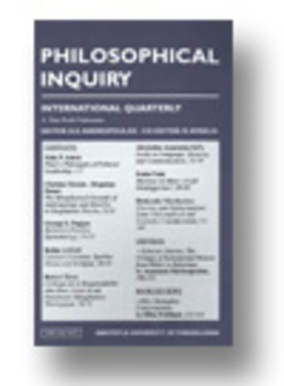The concept of being and the ontological status of Plato's "the one", "the good" and the ideas
Part of : Philosophical inquiry ; Vol.XXVI, No.4, 2004, pages 67-88
Issue:
Pages:
67-88
Author:
Abstract:
This paper discusses the question concerning the ontological status of Plato's “One”, “the Good” and the Ideas. It begins by putting the question in perspective by raising the two opposite interpretations, the Neo-Kantianism on the one hand and the re-emergence of the question of “Being" in the twentieth century on the other. Having briefly examined Paul Natorp’s view, its goes further to see the interpretations the Tubingen School, particularly that of Hans Krämer, who has reconstructed the system of Platonic ontology based on the “unwritten doctrine”. Taking up Krämer ’s suggestion of the primacy of Seinsgrund while critical to his conclusions on the relation between the dialogues and the unwritten doctrine, it embarks to approach the question by basing on the proposition that Parmenides ’ problem of “One-Being” is Plato’s permeating philosophical concern and yet tries to win a critical distance from Parmendies’ equation of “One” and “Being” by bringing in the perspectives of modem ontology. Using dialogues like Cratylus, Theaetetus, Sophist and the Seventh Letter, it shows that “Being" can only be related to Logos as soon as it is expressed in thought or language, otherwise it is nothing more than a pure intuition of the world as an “One-Being”. This intuition, in turn, is our immediate experience of the world as “a Being ”, which, if not to be spoken of, makes no differentiation between Being as an immediate existence and Being as the aggregate of the world and as the highest category. This explains the origin of Plato ’s theory of ideas, in which Being enters into dialogue and definable accounts. The ontological status of these ideas, therefore, can be accounted for as a combination of Being-intuition and the account of multiplicity, which must engage itself with Logos and be formulated as a philosophical account.
Subject:
Subject (LC):
Notes:
Περιέχει σημειώσεις




